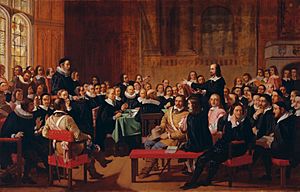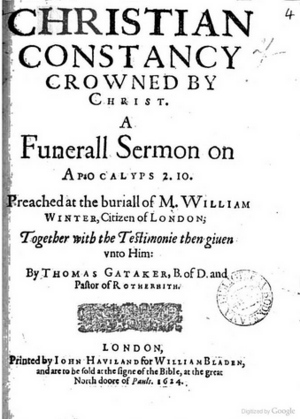Thomas Gataker facts for kids
Thomas Gataker (born in London, 4 September 1574 – died in Cambridge, 27 June 1654) was an English clergyman and theologian. This means he was a religious leader and scholar who studied religion.
Life of Thomas Gataker
Thomas Gataker was born in London. He studied at St John's College, Cambridge, which is a famous university. From 1601 to 1611, he worked as a preacher for a group called Lincoln's Inn. He then became the rector (a type of priest) of Rotherhithe.
In 1642, he was chosen to be part of the Westminster Assembly. This was a very important meeting of religious leaders. They worked to change and improve the Church of England. Gataker helped them by adding notes to parts of the Bible, like the books of Isaiah, Jeremiah, and Lamentations.
He did not agree with some of the new rules introduced by the Assembly, like the Covenant. He preferred the system of episcopacy, where bishops lead the church. He was also one of many London clergymen who disagreed with the trial of King Charles I.
Thomas Gataker also had a public disagreement with an astrologer named William Lilly. Lilly had written about Gataker in his almanac (a type of yearly calendar with predictions).
Thomas Gataker's Works
Besides many sermons, here are some of his most important books:
- Of the Nature and Use of Lots (1619): This was a very interesting book. It discussed games of chance. Some people thought Gataker supported gambling. But he actually argued that these games could not be used to know what God wanted. A famous writer named Boswell called it a "learned book." A new version of this book was published in 2008.
- Dissertatio de stylo Novi Testamenti (1648): This book was about the writing style of the New Testament part of the Bible.
- Cinnus, sive Adversaria miscellanea (1651): This book was a collection of his notes. It helped explain many parts of the Bible and other old writings. Later, more notes were added to it.
- He also edited a book called Meditations by Marcus Aurelius (1652). Marcus Aurelius was an ancient Roman emperor and philosopher.
All of Thomas Gataker's collected works were published together in Utrecht in 1698.
 | William M. Jackson |
 | Juan E. Gilbert |
 | Neil deGrasse Tyson |



